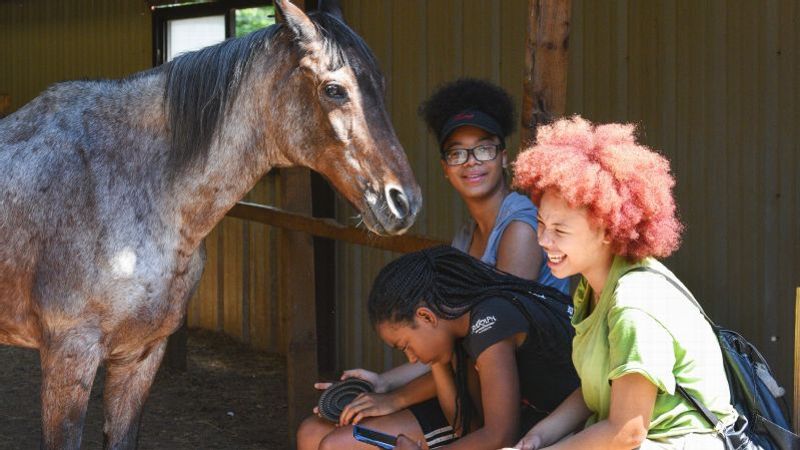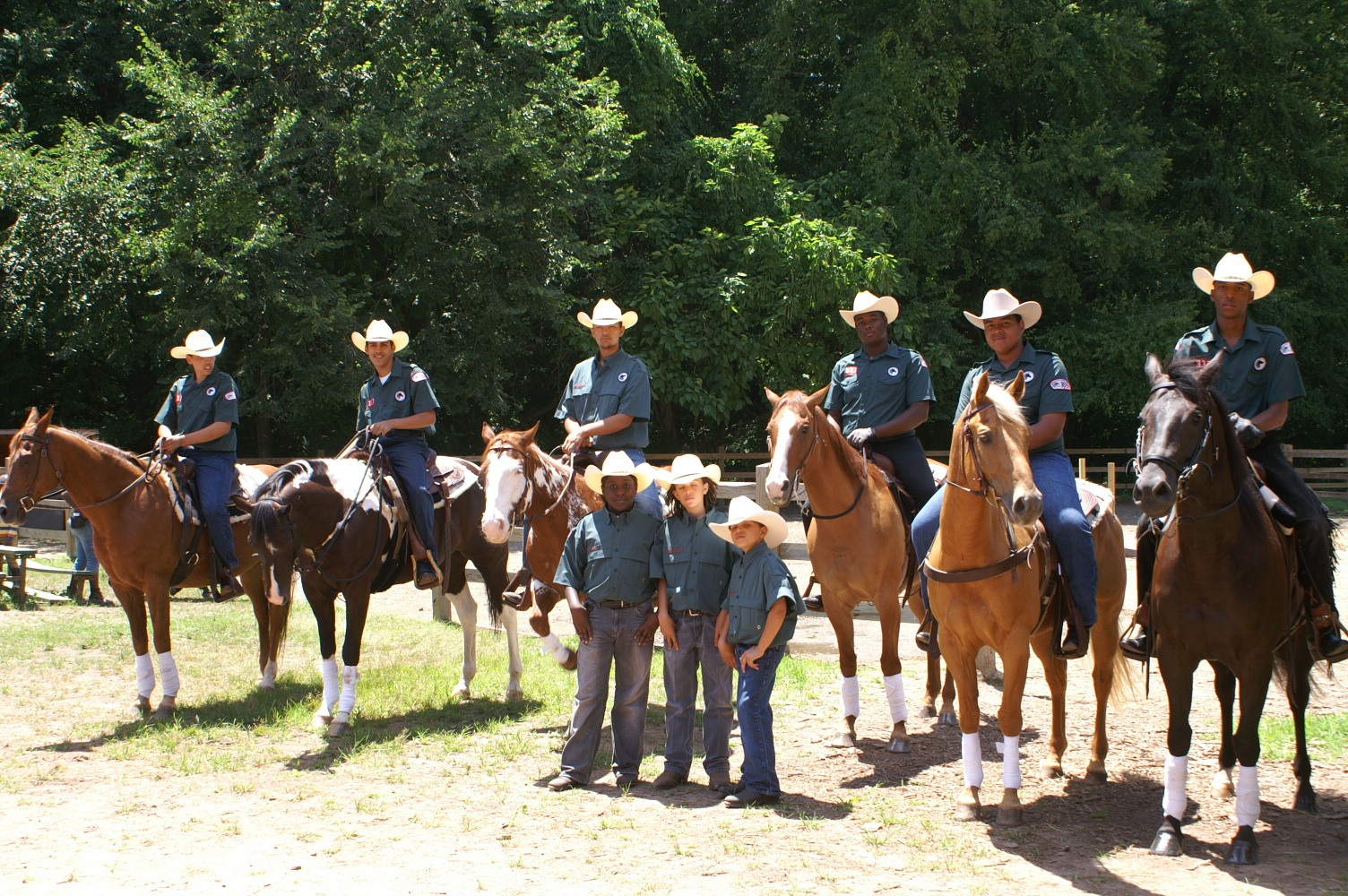
State Line Tack® is proud to bring you the inside scoop on riding programs that are working hard to bring access to horses to kids of all ages. This month's spotlight is on Ebony Horsewomen.
What is Ebony Horsewomen?
Founded by Patricia E. Kelly in 1984, Ebony Horsewomen, Inc. was initially conceived as a cultural enrichment organization. Made up of African American female equestrians who operated community programs and rode in rodeos, EHI has morphed over the years into a comprehensive equine educational and therapy program.
A Grocer and a Horse and Wagon
In the early 1950s, Patricia’s parents moved to a new neighborhood. There, their neighbor was a Jewish grocer who owned a horse and wagon for his business. Mr. Fisher, the grocer, allowed Patricia to groom and ride the horse until its unfortunate death 2 years later in a fire.
However, this short timespan was long enough to ingrain her desire for the equestrian lifestyle. Growing up as a horse crazy youth, many people thought it strange for a colored girl
to fancy herself a cowgirl, with no visible representation to inspire her to it.
Marine Corps, a Men’s Group and New Beginnings:
Patricia joined the USMC after high school, and after she left the Corps, she yearned to rejoin the equestrian community. She connected with a men’s group in Hartford, CT - the Ebony Horsemen - a noted and long-standing group of African American horsemen.
Based on her experience with that group, Patricia and her youngest daughter organized the Ebony Horsewomen, which immediately started attracting skilled equestrians from Alaska to Maine, women who appeared in parades, rodeos, and horse shows all across America.
They became the first African American all-female equestrian organization to be invited to participate in the Tournament of Roses Parade in 1990, and the State of Connecticut Legislature proclaimed them as Goodwill Ambassadors.
EHI Youth Programs:
EHI’s equine youth programs provide young men and women with a comprehensive education that promotes STEM learning, as well as equestrian skills such as horsemanship training, anatomy and psychology, husbandry and research, and equine-assisted growth and learning. Their youth programs are:
- EHI Junior Mounted Patrol Program - designed to help young African American and Latino men develop skills and insight to become productive community members through the image of The American Cowboy
- EHI Extended Day Program - open to kids 5-18, this program takes place three days a week, for two hours after school, and promotes STEM as well as horsemanship
- EHI Saturday Saddle & 4-H® Club - an educational development program where kids can learn about horses as well as the other programs 4-H® offers, such as computers, cooking, art, gardening and more
- Young Ladies Dressage Team & Academy - a program that focuses not only on Dressage Team culture, but provides leadership, education, culture, and developmental support with independent thinking and problem-solving
- EHI Summer Day Camp - a weekly summer camp that offers equestrian programming, as well as organic gardening, culinary arts, dance, and fitness, plus serves breakfast and lunch
EHI Horses That Heal:
Not only for kids, EHI also offers Equine Assisted Psychotherapy for veterans as well as first responders. Their clinical staff recognizes the usefulness of horses in understanding how clients interact with people, and the patients gain self-awareness by the immediate feedback that a horse can provide to attitude and behavior.
Q&A with Mounted Patrol Supervisor, Chaz Carroll:
Chaz Carroll is a Hartford native who currently oversees the Junior Mounted Patrol unit, which meets every week to provide the city’s male minorities with inspiration and education.
The JMP Unit also provides community service as Mounted Park Rangers for the City of Hartford’s beautiful and historic 693-acre Keney Park.
We had the opportunity to sit down with him and chat about EHI, the program attendees, and the power of the horse. Read on to learn about EHI’s goals, what drives Chaz and the program, and what EHI needs to reach out to the next generation of horsemen and horsewomen.

Q: What attracted you to EHI?
A: 35 years ago, the Mounted Patrol Unit of the Harford Police was based out of EHI’s facility - my dad was a cop for 20 years until he retired from the force. He knew I always loved horses, so on the weekends when he wasn’t working, he took me to the barn to see the police horses and their program.
Eventually the Mounted Patrol Unit lost their funding and closed up shop. It was then that Patricia was able to secure the facility for EHI. My dad took me to the Saturday EHI program to fill the void, and I’ve never left!
Q: What do you think people should know about the EHI programs?
A: This is truly a therapeutic center, not only because of our licensed therapists and professionals, either. In the middle of chaos, violence, and negativity, kids and adults find a safe haven where horses heal.
Surrounded by hundreds of acres, with horses and animals, you can really leave your problems behind here. Horses, urban - we are unique and one of a kind.

Q: Is there a particular moment or memory that stands out for you?
A: We were shut down due to COVID, with all programs halted. Staff were allowed in to care for the horses, but no program attendees. As the restrictions loosened, we decided to bring the JMP seniors in to do chores and exercise the horses - work, and trail ride, with social distancing.
I’ve been leading the JMP kids for two years now, and as much as I love it, it can be really tough. It can be hard to get respect from these teens, to get them to think about their behaviors and their futures long-term, and not in the moment. I’m the only adult male in the organization, and I came in and started demanding that they be accountable for their actions, and of course that got some pushback!
But, that day, the first day back - those kids and I had a wonderful time. I finally really felt that I had a connection with the seniors. The craziness of the world with COVID - it changed their perspective. Here are these kids, stuck in their houses with no outlet - no school, no friends, no horses.
They were immersed in their lives, with no escape, and some of them are from really rough backgrounds. It was a day filled with mutual respect and support, and we finally had that openness that I’ve been chasing with them.

Q: Can you tell me about a specific person who has thrived in your program? How did it help or change them?
A: We have several, but one really comes to mind - Nazir. True Hallmark story type! He has been with our program since he was 8, he has asymmetric legs, and consequently has undergone surgeries to have pins placed in his hips. He, like so many of our attendees, has a not-so-great home life, but he is so spirited and hard-working.
He’s there for the riding but will pitch in and work hard to do whatever is needed. When he came to us, he was teased and bullied in school, and would cry nearly ever day. One-on-one time with horses, plus building relationships with the program mentors, has really gotten him to trust that there are people that care, that are invested in his success.
In two years, he’s gotten to be so strong, so confident. Ambitious! He’s really blossomed and is currently the equipment manager for the mounted patrol, and has learned to stand up for himself, both in the program, and in life.
Q: What is the biggest challenge the program is facing currently?
A: Well, the same issue that faces most non-profits - finances. We apply for and receive grants, but they never cover everything the program needs. COVID was really hard on us too - we were uncertain on whether we would even be able to pay the employees since the programs were shut down.
But everyone came to work because we love what we do. Lots of families can’t afford our programs, but we allow the kids to come, because we just can’t turn them away.
Also, our horses are aging - we have a very senior herd of 15, with all of them being over the age of 17, except two. We need donations of beginner safe horses - we will accept fixable behavior problems, but the horses absolutely need to be safe.
Q: What do you need, or how do you plan on tackling that challenge?
A: We typically have big spring and fall fundraisers, that had to go virtual this year - silent auctions and the like. We are producing a mini documentary online for use on social media and YouTube in hopes that it will generate more donations.
Our Therapeutic Program has been allowed to restart, so that does help. But we need donations - both monetary, and of horses - to continue.
Q: What motivates the EHI employees and volunteers to keep going?
A: We are a herd, just like the horses. A business, but a family - though we try to keep it separate for the sake of the business! We are here not just to make a living, but to connect with every person that walks through that door.
Not just a service, but a lifeline for people that don’t have the access or ability to get what they need. That is what keeps us going - changing lives, one day at a time.
Be sure to stay tuned to Facebook, Instagram and https://www.ebonyhorsewomen.us/ for updates on EHI and their next steps on their way to serving Harford’s youth.
This article originally appeared on Stateline Tack and is published here with permission.
You can find Stateline Tack in our section on English & Western Tack.
There are lots of interesting articles in our section on Health & Education.

































